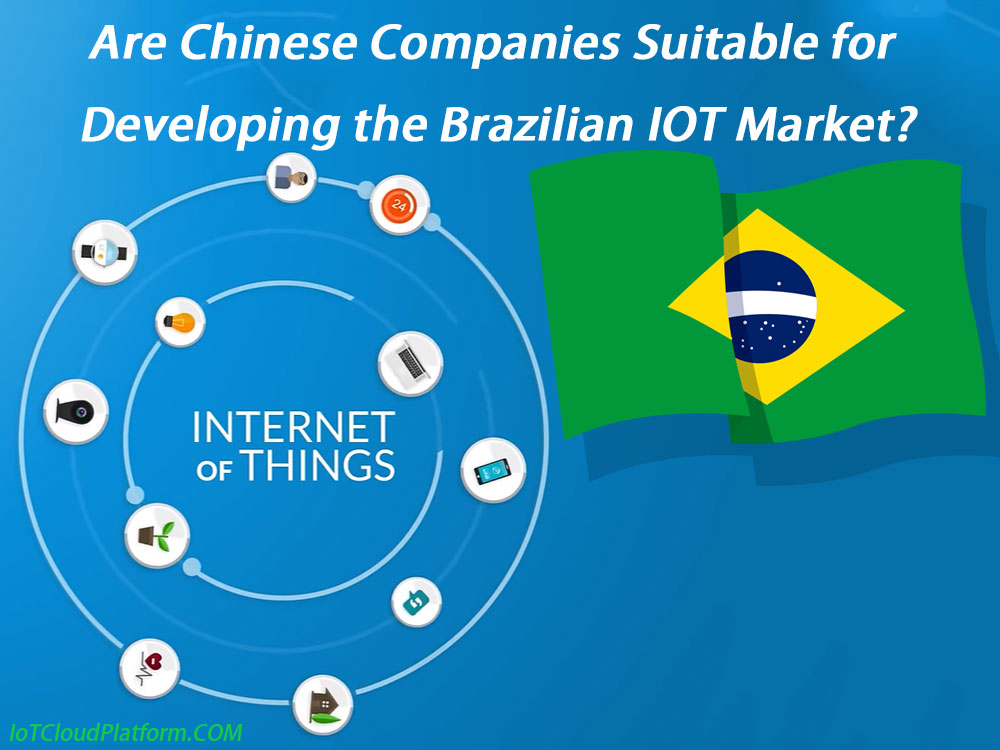
Are Chinese Companies Suitable for Developing the Brazilian IOT Market?
Whether Chinese companies are suitable for developing Brazil’s IoT (Internet of Things) market is a comprehensive consideration involving many factors.
The following will be analyzed in detail from the perspectives of market demand, policy support, infrastructure, competitive environment, corporate advantages, challenges and opportunities.
Market demand
Brazil’s economic growth and IoT market potential
In recent years, although Brazil’s economy has fluctuated, it has shown an overall recovery trend. According to data from the Brazilian Institute of Geography and Statistics, Brazil’s GDP has achieved growth in both 2022 and 2023, showing an increase in economic vitality.
With the growth of Brazil’s economy and the improvement of people’s living standards, the demand for IoT applications such as smart devices, smart homes, and smart cities is also increasing.
Promotion of digital transformation
The Brazilian government is actively promoting digital transformation to improve the efficiency of public services and promote economic development. This policy orientation provides strong support for the development of the IoT market.
In addition, Brazil has huge digital transformation needs in agriculture, manufacturing, energy and other fields, providing a broad market space for the application of IoT technology.
Policy support
Government policies and incentives
In order to attract foreign investment and promote the development of local technology companies, the Brazilian government has introduced a series of preferential policies, including tax incentives, financing support, and innovation funds. These policies provide a good policy environment for Chinese companies to develop the sensor-devices-and-solutions-examples/">IoT market in Brazil.
International cooperation and agreements
As important members of the BRICS, China and Brazil have a broad basis for cooperation in the field of digital economy. The two governments have signed a series of cooperation agreements to jointly promote the development of the digital economy and IoT. These cooperation agreements provide a strong guarantee for Chinese companies to deploy IoT in Brazil.
Infrastructure
Communication infrastructure
Brazil’s communication infrastructure has been significantly improved in recent years, especially the penetration rate of mobile Internet has increased significantly. This provides a good basic condition for the connection and data transmission of IoT devices. In addition, Brazil is also actively promoting the deployment of 5G networks, which will further enhance the performance and experience of IoT applications.
Data center and cloud computing
Brazil’s cloud computing market is also developing rapidly, providing Chinese companies with convenient data storage and processing services. For example, Tencent Cloud has set up a data center in Sao Paulo, Brazil, providing cloud services to local and South American customers. This provides strong technical support for Chinese companies to develop the IoT market in Brazil.
Competitive environment
Market competition pattern
Brazil’s IoT market has begun to take shape, attracting the attention of many domestic and foreign companies. International giants including IBM, Microsoft, Intel and some local technology companies have made layouts in this market. Chinese companies will face fierce competition when entering the Brazilian IoT market.
Competitive advantages
Chinese companies have certain competitive advantages in the field of IoT, including technological innovation, cost control, and product customization. Chinese companies have made significant progress in key technologies such as IoT chips, sensors, and smart devices, and have strong market competitiveness. In addition, the successful experience of Chinese companies in the global market also provides strong support for their expansion in the Brazilian market.
Enterprise advantages
Technological innovation
Chinese companies have strong strength in IoT technology innovation. Through continuous investment in research and development, Chinese companies have achieved remarkable results in key technology fields such as IoT chips, sensors, cloud computing, and big data. These technological achievements provide solid technical support for Chinese companies to develop the IoT market in Brazil.
Localized services
Chinese companies pay attention to localized services in the process of expanding overseas markets. By deeply understanding local market needs and cultural characteristics, Chinese companies can provide products and services that better meet the needs of local consumers. In the Brazilian market, Chinese companies can make full use of their advantages in localized services and strengthen cooperation with local companies and consumers.
Challenges and opportunities
Challenges
- Talent shortage: There is a shortage of compound talents who know Portuguese and have professional knowledge in the Brazilian market, which increases the difficulty of local operations for companies.
- Policies and regulations: Brazil’s policies and regulations are relatively complex and changeable. Companies need to pay close attention to policy trends during operations to avoid compliance risks.
- Cultural differences: There are large differences between China and Brazil in terms of culture, business habits, etc. Companies need to fully consider these factors in the process of market expansion to avoid cultural conflicts.
Opportunities
- Strong market demand: Brazil has huge market demand in digital transformation and smart city construction, providing Chinese companies with broad development space.
- Policy support: The Brazilian government has introduced a series of preferential policies to attract foreign investment and promote technological innovation, providing strong support for the development of Chinese companies in the local area.
- International cooperation: China and Brazil have a broad cooperation foundation in the field of digital economy. The cooperation between the two governments and enterprises will provide more opportunities for Chinese companies to expand in the Brazilian market.
Conclusion
In summary, Chinese companies have great potential and opportunities to develop the IoT market in Brazil. Although facing challenges such as talent shortage and complex policies and regulations, Chinese companies can succeed in the Brazilian IoT market by strengthening technological innovation, providing localized services, and actively responding to policy changes.
At the same time, the Chinese government and enterprises should strengthen cooperation and exchanges with the Brazilian government to jointly promote bilateral cooperation and development in the digital economy and IoT fields.
About Brazil IoT Cloud Platform
IoT Cloud Platform (iotcloudplatform.com) We are an IoT service company in Shenzhen, China. Founded in 2008, we focus on IoT technology application solutions, including industrial IoT, military IoT, IOT manufacturing, smart logistics, smart cities, smart warehousing, etc.
Brazil IoT Cloud Platform is an online IoT cooperation project we established in Brazil, serving Chinese IoT companies, Japanese IoT companies, American IoT companies, Canadian IoT suppliers, etc. in Brazil.
Brazil IoT FAQs
Brazil’s broadband and communication infrastructure may not be sufficient to support large-scale IoT projects in some areas. Therefore, when entering the market, Chinese companies need to consider cooperating with local communication operators to jointly improve the infrastructure level.
Yes, language and cultural differences may be a challenge. Companies need to ensure that products, services and documents support Portuguese and consider cultural adaptability to better communicate with the Brazilian market.
Security and privacy are key challenges for IoT projects. Chinese companies need to ensure the use of the latest security technologies and protocols to protect user data from being leaked or abused, while complying with Brazil’s data protection regulations.
The Brazilian market may require IoT devices and systems to meet certain standards and specifications to ensure interoperability between devices. Chinese companies need to understand and comply with these standards to ensure product compatibility and market competitiveness.
The Brazilian government may introduce a series of policies and regulations to regulate the development of the IoT market, including data protection, network security, privacy protection, etc. Chinese companies need to understand and comply with these policies and regulations in detail before entering the market.
The IoT industry in the Brazilian market is highly competitive, with not only local companies but also multinational companies from other countries. Chinese companies need to develop differentiated market strategies and enhance the competitiveness of products and services to stand out in the market.
The cost of IoT devices may become a barrier in the Brazilian market because many devices are imported and have higher prices. Chinese companies can consider working with local manufacturers to reduce costs and increase market acceptance.
Brazilian consumers’ acceptance of the IoT is gradually increasing, but market education and promotion are still needed. Chinese companies can increase consumer awareness and acceptance of the IoT by holding promotional events and providing user training.
IOT Cloud Platform
IOT Cloud Platform is an IoT portal established by a Chinese IoT company, focusing on technical solutions in the fields of agricultural IoT, industrial IoT, medical IoT, security IoT, military IoT, meteorological IoT, consumer IoT, automotive IoT, commercial IoT, infrastructure IoT, smart warehousing and logistics, smart home, smart city, smart healthcare, smart lighting, etc.
The IoT Cloud Platform blog is a top IoT technology stack, providing technical knowledge on IoT, robotics, artificial intelligence (generative artificial intelligence AIGC), edge computing, AR/VR, cloud computing, quantum computing, blockchain, smart surveillance cameras, drones, RFID tags, gateways, GPS, 3D printing, 4D printing, autonomous driving, etc.




